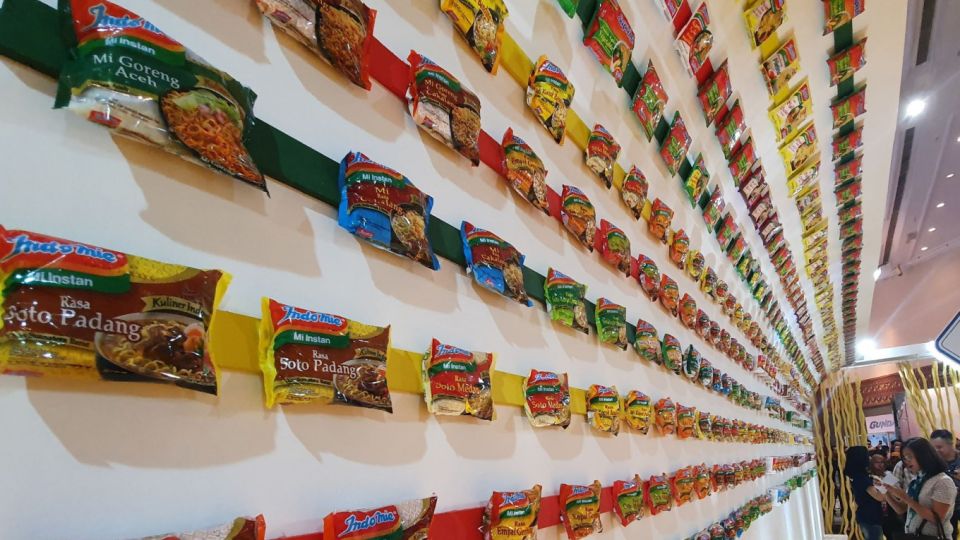September 16, 2025
JAKARTA – The Food and Drug Monitoring Agency (BPOM) says a variant of instant noodle brand Indomie flagged by Taiwanese authorities for containing a carcinogenic substance is safe for consumption based on Indonesian standards.
“According to the results of our examination of BPOM’s registration data, the product variant [in question] has a distribution permit from BPOM; hence it can be sold in Indonesia and remains safe for consumption,” the agency wrote in a statement published on Friday, after the detection of ethylene oxide (EtO) in Indomie’s Rasa Soto Banjar Limau Kuit variant.
BPOM said it would “keep coordinating with Taiwanese authorities and other stakeholders to take action and monitor the developments in this matter”.
Indomie producer PT Indofood CBP Sukses Makmur (ICBP) has admitted that the product tested in Taiwan did not meet that country’s standards.
However, the producer said it had not “officially exported” the flagged product to Taiwan, accusing a trader or “unauthorized importers” for arranging the shipment without the company’s knowledge.
ICBP insisted that “all instant noodles produced by the company in Indonesia are processed in compliance with the food safety standards set by BPOM and the Codex Standard for instant noodles”, referring to an international set of food standards, guidelines and codes of practice devised by the Codex Alimentarius Commission (CAC), which was established by the World Health Organization and the Food and Agriculture Organization (FAO).
Read also: Taiwan raises alert over cancer-causing chemical in Indomie
The company also said in a statement on Friday that its instant noodles had obtained Indonesian National Standard (SNI) approval and were produced in “certified production facilities based on international standards” for food safety management systems.
“ICBP has been exporting instant noodle products to various countries around the world for over 30 years. The company continuously ensures that all of its products comply with the food safety regulations and standards applicable in the countries where ICBP’s instant noodles are marketed,” the statement reads.
The firm is currently investigating the raw materials used in producing the variant and the cause of the findings.
According to BPOM, Taiwanese standards do not allow for any EtO in food products.
Meanwhile, other countries apply different standards, including the United States, the European Union and Indonesia, which set separate limits for EtO and its reaction product 2-chloroethanol (2-CE). This standard tests 2-CE as the measurable substance, rather than including it as part of the total EtO limit.
The Trade Ministry’s director general for national export development, Fajarini Puntodewi, emphasized that the CAC had yet to stipulate a limit for EtO.
“The standards being implemented in each country are different. For instance, the European Union has a limit of 0.1 ppm [parts per million], the US has 7 ppm and Singapore has 50 ppm for [foods under the category of] spices,” she told The Jakarta Post on Monday.
The differing standards pose a challenge for businesses in adjusting their products based on the prevailing regulations in each market, Fajarini added, while stressing that “adjustment to higher standards will strengthen the competitiveness of Indonesian products in the medium and long term”.
The test conducted by Taiwan’s Food and Drug Administration (FDA) following a consumer complaint on Aug. 6 resulted in findings announced on Sept. 9 that the variant’s seasoning packet contained 0.1 mg/kg of EtO.
“According to the Pesticide Residue Tolerance Standards, ethylene oxide must not be detected. This case does not comply with Article 15 of the Food Safety and Sanitation Management Act,” the Taiwan FDA said.
The agency urged the public to avoid all Soto Banjar Limau Kuit variants, whether purchased in Taiwan or brought in from overseas, adding that the noncompliant product will be returned or destroyed in accordance with regulations.
Ethylene oxide is a colorless gas widely used in manufacturing products like antifreeze, plastics, detergents and adhesives. It is also used to sterilize medical equipment and certain food items, including spices and dried herbs.
While effective in industry, the chemical is classified as a human carcinogen. Long-term exposure has been linked to cancers of the blood and breast cancer, making any detectable levels in food a concern for regulators worldwide.
Taiwan has rejected Indonesian instant noodles multiple times over the past few years over similar alerts on cancer-inducing substances.
In April 2023, Taiwan pulled the Indomie chicken special variant from shelves after detecting traces of EtO. In response to the decision by health authorities in Taiwan, Malaysia’s Health Ministry also ordered the recall of two types of instant noodles, one of which was the same Indomie variant.
At the time, BPOM also said that the substance was found at levels that were acceptable by the agency’s standards, which allows food products manufactured in Indonesia to contain up to 85 ppm of EtO. Meanwhile, the level detected in Taiwan was 0.34 ppm.
Read also: Indomie variant safe to eat, BPOM insists
Trade Minister Budi Santoso, who was serving as the ministry’s director general of foreign trade at the time, pointed to the differing standards: “Taiwan has a different regulation, they are more sensitive to this issue,” he said, as reported by news agency Antara.
He also pointed to another case from October 2022, when Taiwanese authorities recalled a variant of Indonesia’s Wing’s Food noodle brand Mie Sedaap because of the detection of EtO. “We resolved the issue at the time. In the end, the Taiwanese side, Taiwan’s FDA, came here to verify the findings,” Budi said.


